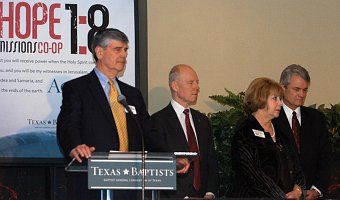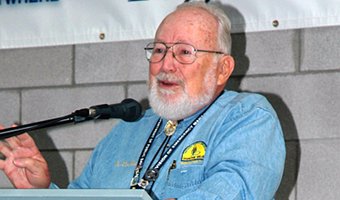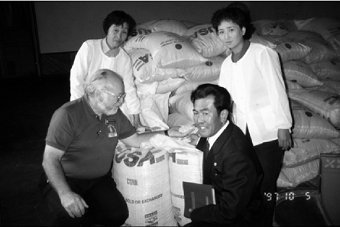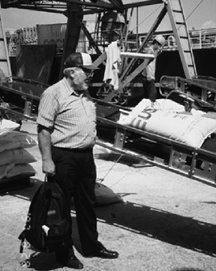DALLAS—Relationships to Baptist institutions—including one university that opened its governing board to include non-Baptists, another university that is increasing its capital debt by $40 million and a financially troubled health care system whose hospitals have entered a joint venture with a for-profit hospital—dominated discussion at the Baptist General Convention of Texas Executive Board’s Feb. 21-22 meeting.

Responding to questions about Baylor University at the Baptist General Convention of Texas Executive Board meeting are (left to right) Houston attorney Bob Fowler, representing the board’s Institutional Relations Committee; Dary Stone of Dallas, chair of the Baylor University board of regents; Debbie Ferrier of Houston, chair of the BGCT Executive Board; and Gary Elliston of Dallas, a BGCT-elected Baylor regent. (PHOTO/John Hall/BGCT)
|
Baylor University regents recently voted to amend the university’s bylaws, allowing non-Baptist Christians to comprise up to 25 percent of the school’s governing board.
In response, the BGCT Executive Board affirmed the Baptist state convention’s historic relationship with Baylor University and authorized the board’s chair to appoint a task force to meet with representatives of the university’s regents to discuss the future of that relationship.
“The goal for these discussions would be a better understanding of Baylor’s vision for the future and a harmonious relationship” between the university and the BGCT, the motion said. The task force will report back to the board at its May 23-24 meeting.
Baylor President Ken Starr and three regents—Chairman Dary Stone of Dallas, Gary Elliston of Dallas and Ramiro Peña of Waco—made a presentation and responded to questions from the Executive Board’s Institutional Relations Committee regarding the action. The three regents—along with Linda Brian of Amarillo, who is both a Baylor regent and a director of the BGCT Executive Board—also spoke to the full board.
The regents insisted they value Baylor’s close relationship to the BGCT.
“We are a Texas Baptist institution, we have been throughout our history, and we always will be so,” said Elliston, a BGCT-elected regent.
Regents chose to make available to non-Baptist Christians up to one-fourth of its board seats so alumni and other supporters of the school would not feel like “second-class citizens, but could aspire to involvement at the highest level of university governance,” Stone said.
“Only 31 percent of our freshman class claim the Baptist label,” he added, noting the percentage of Baptist students has been declining about 2 percent a year and likely will drop to 20 percent within this decade.

Jeff Johnson, pastor of First Baptist Church in Del Rio, raises questions about how effectively Baylor University regents communicated to Baptist General Convention of Texas leaders their intention to open some chairs on the board of regents to non-Baptist Christians. (PHOTO/John Hall/BGCT)
|
While the change allows non-Baptists a minority presence on the board, regents “built a firewall to ensure we always will be a Baptist institution going forward,” Stone said.
Any future change in the percentage of non-Baptists on the board will require the approval of 75 percent of the board’s Baptist regents; either the chair or vice chair of the board must be Baptist; a Baptist officer must preside over any vote related to a change in Baptist board representation; and only Baptists on the board will vote on matters concerning the university’s Truett Theological Seminary, the regents explained.
Jeff Johnson, an Executive Board director from Del Rio, expressed concern about a perceived “communication breakdown” between Baylor and BGCT leaders.
He and some others also questioned the timing of the regents’ action, particularly after messengers to the BGCT annual meeting in November soundly rejected a similar proposal—an Executive Board recommendation that Houston Baptist University be allowed to elect some non-Baptist trustees.
“It was a difficult situation,” Elliston acknowledged. “No one at Baylor meant any disrespect toward Texas Baptists, and it was not meant as a slight to this group (the Executive Board) in any way.”
Regents had spent at least four years discussing the possibility of opening board membership to some non-Baptists, he noted.
“According to our relationship agreement with the BGCT, the board of regents was within its legal rights to take the action we did, and we did so because of our fiduciary responsibility to act in the best interests of Baylor,” Elliston said.
Messenger action regarding Houston Baptist University at the 2010 annual meeting in McAllen complicated matters, he acknowledged.
If Baylor regents had asked the BGCT board to endorse its plan to open some seats to non-Baptists, “we would have put you squarely in the position of being asked to do what the convention said not to do,” he said. And if the board had rejected what a majority of regents believed was in the school’s best interests, Baylor’s regents would have been in a position of acting in open defiance of the Executive Board.
“If we offended you, we apologize. … From our perspective, if it was the right thing to do, it was the right thing to do now,” Elliston said.
Ed Jackson of Garland, originator of the motion the Executive Board approved, explained his rationale after the meeting. Allowing a task force to deal with the matter rather than taking immediate action in a board meeting “will let emotions subside so that we can deal with the substance of this discussion,” he said. At the same time, it leaves the door open for the board to act in May if it chooses to do so after the matter has been discussed thoroughly.
“This motion notifies Texas Baptists that we have not ignored the action of the Baylor board of regents. It affirms the past, yet it looks forward. It promotes communication and discussion between two autonomous organizations with the goal of harmony and understanding, giving us a hope of a better relationship,” he said.
After the board approved the motion regarding Baylor, Bruce Webb of The Woodlands introduced a resolution expressing appreciation to the Houston Baptist University trustees for the consideration they showed to the Executive Board. The resolution carried overwhelmingly.
In other action, the Executive Board approved a request from the University of Mary Hardin-Baylor’s trustees to increase indebtedness beyond the prescribed limit of 20 percent of total audited net assets.
UMHB trustees approved a campus master plan that involves a $100 million building program over the next three to seven years. However, the trustees’ action was made contingent on Executive Board permission to increase its indebtedness up to 64 percent of net assets.
UMHB President Randy O’Rear explained to the Institutional Relations Committee the building program includes a $20 million building for the school’s College of Nursing and a $25 million student union building, as well as an on-campus football stadium, a performing arts building, a visual arts center, field house expansion and relocation of the physical plant operations building.
Bob Fowler of Houston, who served on the Executive Board’s debt-review task force and presided over the Institutional Relations Committee meeting, noted UMHB’s “history of responsible handling of its finances.” The task force and committee recommended UMHB be granted a waiver of the 20 percent ceiling on indebtedness but also issued a six-part recommendation the Executive Board endorsed:
• Preserve existing cash reserves to provide an ultimate source of repayment of a portion of the debt incurred.
• Secure a commitment of pledges to a major capital campaign in an appropriate and substantial amount before any portion of the new debt is used to fund capital projects.
• Keep in mind fulfillment of capital campaign pledges often negatively impacts general annual giving, and carefully monitor that impact.
• Make the stability and reasonable growth of the student population “a sharp and defined focus of administration effort … especially during the debt incurring and early servicing years.”
• Do not, under any circumstances, use any part of the authorized borrowed funds— directly or indirectly—for the university’s operating expenses, including debt service.
• Provide the boards’ Institutional Relations Committee annual reports on the financing and implementation of the campus master plan.
The Executive Board also heard a report regarding Valley Baptist Health System . James Eastham, president of the health system, told the Institutional Relations Committee the system’s hospital in Harlingen sustained significant damage and service interruption due to Hurricane Dolly in 2008.
Since the health system serves a rapidly growing but economically disadvantaged area where more than 41 percent of the population is uninsured, it could not maintain the cash balance its lenders require. Valley Baptist Health System owes about $190 million, mostly in tax-exempt bonds that could be called in 18 months, and its bank required the system to develop a recapitalization plan.
Consequently, representatives of Valley Baptist Health System signed a letter of intent for its operational units to enter into a joint venture with the for-profit Vanguard Health.
Since the BGCT relates to the health care system’s holding company, not its operating units, the matter did not affect BGCT-related governance and or require Executive Board action.
The Executive Board voted to extend its guarantee of a loan for Baptist University of the Americas. The BGCT previously had pledged investments as collateral for a $2.5 million bank loan to BUA. Since that original loan matured, the board voted to extend it to May 31. In the meantime, BUA will continue to negotiate the loan’s refinancing. Any further obligation by the BGCT after May 31 will have to be considered by the Executive Board.
In other business, the board voted to fill several vacancies created since the annual meeting: Ronny Marriott, pastor of First Baptist Church in Corpus Christi, to the Theological Education Council; Sally Eaves from First Baptist Church in Plainview to the Wayland Baptist University board of trustees; Don Ringler of Taylors Valley Baptist Church in Temple, to the University of Mary Hardin-Baylor board of trustees; Kathy Hillman from Columbus Avenue Baptist Church in Waco to the Committee on Nominations for Executive Board Directors; Jim Nelson from First Baptist Church in Austin to the Committee on Nominations for Boards of Affiliated Ministries; and Jeff Humphrey, minister of education at First Baptist Church in Allen, and Greg Wallace, pastor of Woodridge Baptist Church in Kingwood, to the Executive Board.
Editor's Note: As originally posted, two names were omitted in the last paragraph. The article has been corrected to provide full information. Also, the church affiliation of one individual in the last paragraph was corrected.
 If included in the final state budget, all professional prison chaplains would lose their jobs. Fifty-five of the 120 chaplains are endorsed by the Baptist General Convention of Texas.
If included in the final state budget, all professional prison chaplains would lose their jobs. Fifty-five of the 120 chaplains are endorsed by the Baptist General Convention of Texas. 











